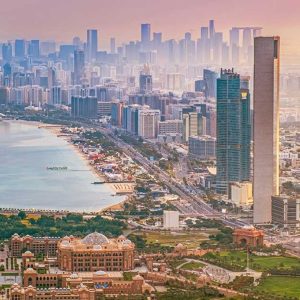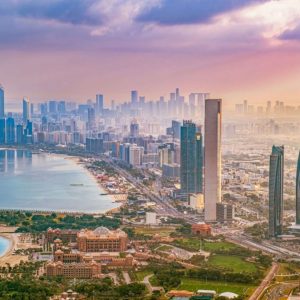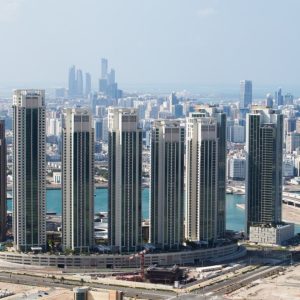
Real Estate Taxation in Abu Dhabi
Abu Dhabi, the capital of the United Arab Emirates (UAE), has long been a lucrative market for real estate investors. With its booming economy, tax-free environment, and world-class infrastructure, Abu Dhabi remains one of the most attractive destinations for real estate investment in 2025, offering opportunities for investors to obtain an Investor Visa.
However, understanding the taxation system is crucial for anyone looking to invest in the city’s property market. In this guide, we’ll dive into real estate taxation in Abu Dhabi, explain how the system works, and explore important topics like living in Abu Dhabi, the best neighborhoods to invest in, and investing in real estate in Abu Dhabi in 2025.
Whether you’re a new investor or experienced in the market, this article will give you the information you need to navigate the Abu Dhabi real estate landscape.

Real Estate Taxation in Abu Dhabi: An Overview
The UAE, and specifically Abu Dhabi, is known for its investor-friendly tax policies. For real estate investors, this means opportunities to maximize returns without the burden of heavy taxation. However, while there are no property taxes, capital gains taxes, or inheritance taxes in Abu Dhabi, it’s essential to understand the nuances of VAT and other fees that may apply, especially when considering to Buy Off-Plan Property in Abu Dhabi.
Key Taxes and Fees on Real Estate in Abu Dhabi
Real estate in Abu Dhabi benefits from no income or capital gains tax, making it highly investor-friendly. However, buyers must consider transaction costs such as transfer fees, mortgage registration, and service charges. Understanding these taxes and fees ensures accurate financial planning and maximizes investment returns.
No Property Tax
One of the most significant advantages of investing in Abu Dhabi real estate is the absence of property tax. Unlike many other global cities, Abu Dhabi does not charge property taxes, meaning investors can enjoy full rental income without deductions for taxes on their property. This greatly reduces long-term holding costs and makes property ownership more affordable for both local and international buyers.
- No Annual Property Tax: Investors are not required to pay taxes based on the value of their property. This allows owners to hold properties long-term without worrying about rising yearly tax obligations. It also provides stability and predictability for budgeting and investment planning.
- No Tax on Rental Income: Rental income is not subject to tax, allowing investors to keep the full amount of rent they receive. This significantly boosts ROI, especially in high-demand rental areas. It also makes Abu Dhabi one of the most profitable rental markets in the region.
No Capital Gains Tax
Abu Dhabi offers another compelling advantage for real estate investors: there is no capital gains tax. If you decide to sell your property, you will not be taxed on the profits made from the sale. This significantly increases your overall return on investment. As a result, investors can confidently enter and exit the market without financial penalties on appreciation gains.
Tax-Free Profits: Investors can sell their properties without worrying about paying taxes on the profits. This creates a more flexible investment environment and supports strategies like flipping or upgrading properties. It ensures investors keep full financial benefit from market appreciation.
Increased Investment Appeal: The absence of capital gains tax makes Abu Dhabi one of the most attractive real estate markets in the region. It positions the city as a competitive alternative to high-tax global markets. This advantage continues to draw international investors seeking stronger net gains.
No Inheritance Tax
Unlike many other countries, the UAE does not impose inheritance taxes on properties passed down to heirs. This gives investors a strong long-term advantage, making Abu Dhabi real estate ideal for families aiming to secure, grow, and transfer wealth across generations.
Smooth Property Transfer: Investors can pass down real estate to their heirs without paying any inheritance tax, ensuring the full property value remains in the family. This removes financial pressure during succession and allows heirs to take ownership without facing unexpected costs or legal complications.
Family Wealth Preservation: With no tax applied on inherited property, families can retain the complete value of their real estate assets over time. This strengthens long-term financial planning and ensures that wealth built today continues to support future generations without erosion.
Value-Added Tax (VAT)
While property taxes and capital gains taxes are absent, Abu Dhabi applies a 5% VAT (Value-Added Tax) on specific real estate transactions. Understanding how and when VAT applies is essential for investors, as it influences overall costs and affects certain services connected to property ownership and management.
New Properties: VAT is applicable on the purchase of new residential properties directly from the developer, especially during the first sale. This means buyers should budget an additional 5% on the initial purchase price when investing in brand-new units.
Real Estate Services: VAT applies to property-related services such as property management, real estate agency commissions, maintenance, and facility management fees. Investors must factor these service-based VAT charges into their annual operating expenses to calculate accurate rental yields.
One-Time Property Purchase Fees
When you buy a property in Abu Dhabi, the government does not charge traditional taxes like stamp duty or annual property tax. However, every buyer must pay certain one-time upfront fees during the purchase and ownership transfer process. These charges ensure legal registration, proper documentation, and smooth transfer of ownership from the seller or developer to the buyer. While they are not considered “taxes,” they are essential costs that every investor should understand before committing to a property. Knowing these fees upfront helps you plan your budget accurately and avoid any surprises on transfer day.
- Municipality Registration Fee (2%):
The most significant upfront expense is the 2% registration fee paid to Abu Dhabi Municipality during the property transfer. In most cases, this cost is fully paid by the buyer, unless a developer promotion or a special agreement reduces or shares the fee. This is a mandatory charge applied to every registered transaction in Abu Dhabi.
- Title Deed Issuance Fee: This fee is required to issue the official title deed, confirming legal ownership of the property under your name. Depending on the property and administrative requirements, the cost typically ranges from AED 100 to AED 1,000, making it one of the smaller but essential fees in the process.
- Administrative & Documentation Fees: Buyers may also encounter several administrative charges during the transfer process, such as NOC fees from the developer, broker admin fees, developer processing fees, and utility registration costs for ADDC, gas, and cooling. These fees vary based on the project and service provider, so it’s important to factor them into your overall purchase budget.
Real Estate Investment in Abu Dhabi in 2025: What You Should Know
Abu Dhabi’s real estate market remains dynamic and appealing to both local and international investors. The government’s Vision 2030 initiative, which focuses on diversifying the economy, is driving growth in various sectors, including real estate. This provides a solid foundation for long-term investments and attractive rental yield in Abu Dhabi.
Trends in Abu Dhabi’s Real Estate Market for 2025
Growing Demand for Residential Properties: Abu Dhabi continues to see a strong influx of expatriates, professionals, and high-net-worth individuals, creating consistent demand across both affordable and luxury housing segments. This steady population growth supports long-term stability in the residential market and drives appreciation in key communities.
Commercial Real Estate: As Abu Dhabi attracts more international companies, government entities, and tech-driven businesses, demand for commercial spaces in major business districts is rising rapidly. Office towers, retail spaces, and mixed-use developments are seeing increased occupancy, boosting investor confidence.
Infrastructure Developments: Large-scale infrastructure projects such as airport expansions, upgraded public transport networks, and new road systems are transforming the city’s connectivity. These improvements enhance accessibility and fuel property growth in emerging neighborhoods that were previously less developed.
Why Invest in Real Estate in Abu Dhabi in 2025?
Tax-Free Environment: Abu Dhabi’s zero property tax and zero capital gains tax create one of the most investor-friendly real estate environments in the region. By eliminating long-term taxes, buyers retain more profit from rental income and resale, making overall ownership significantly more cost-efficient.
Strong Economic Growth: The UAE’s ongoing diversification into technology, logistics, tourism, culture, and renewable energy continues to strengthen Abu Dhabi’s economic base. As new industries grow, demand for real estate rises, pushing property values upward and offering long-term stability for investors.
High Demand: With a growing population, strong job market, and expanding business activity, both residential and commercial properties remain in high demand. This sustained demand supports higher rental yields, faster tenant occupancy, and reduced vacancy risk for landlords.
Off-Plan Property Taxation & Fees
Buying an off-plan property in Abu Dhabi comes with several mandatory fees that buyers should understand before committing to a purchase. While these costs are generally lower than fees associated with ready properties, they still play an important role in budgeting and planning. Below is a breakdown of the key charges every off-plan buyer can expect.
1. Off-Plan Registration Fees
Off-plan buyers also pay the 2% municipality registration fee, usually due at SPA (Sales Purchase Agreement) signing. Payments are deposited into escrow accounts, ensuring buyer protection during construction. This system guarantees that developers can only access funds based on construction progress, increasing transparency and safety for investors.
2. Service Charges During Construction
Service charges are not billed until handover, but developers typically provide an estimate in advance. Depending on location and facilities, fees range between AED 10 to 25 per sq ft per year. These estimates help buyers plan future expenses and understand long-term ownership costs before the property is delivered.
3. Handover Fees
Service charges are not billed until handover, but developers typically provide an estimate in advance. Depending on location and facilities, fees range between AED 10 to 25 per sq ft per year. These estimates help buyers plan future expenses and understand long-term ownership costs before the property is delivered.
Taxes for Property Investors
Although the UAE does not impose personal property tax, investors should be aware of how rental income, corporate tax, and VAT rules work. Abu Dhabi does not tax rental income, allowing landlords to keep their full earnings. The 9% corporate tax applies only to companies operating real estate as a business, while individual investors and personal properties remain exempt. VAT is applied selectively: 5% on commercial properties, 0% on first-sale new residential units, and no VAT on resale residential transactions. Understanding these rules helps investors plan accurately and avoid unexpected costs.
Taxes for Rental Properties
Landlords and tenants should be aware of several rental-related charges in Abu Dhabi. Tenants pay a 5% Municipality Housing Fee added to their monthly ADDC bills, commonly known as the “tenant tax.” Waste management and utility charges are also included in utility statements, though these are service fees rather than taxes. Additionally, Tawtheeq registration and renewal fees apply to every rental contract, with amounts varying based on property type and landlord arrangements.
Taxes for Selling Property
Selling property in Abu Dhabi is tax-free for individual owners, making it highly attractive for investors. There is 0% capital gains tax, allowing sellers to keep the full profit from their sale. While selling, owners may incur standard transaction costs such as mortgage release fees, developer NOC charges, and in rare cases, a shared portion of the transfer fee. Additionally, a 2% agency commission applies, paid by either the seller or buyer depending on the agreement in the sales contract.
Taxes for Foreign Investors
Foreign investors receive the same tax advantages as UAE residents when buying property in Abu Dhabi. They can freely purchase freehold real estate with no additional taxes for non-residents, and all rental income can be fully repatriated without restrictions. Funds can be transferred abroad easily, making the investment process smooth and globally accessible. However, investors should review tax regulations in their home country, as some jurisdictions require reporting of foreign income or assets.
Taxes & Fees for Commercial Properties
Commercial properties such as retail shops, offices, warehouses, industrial units, and mixed-use developments come with additional charges that do not apply to residential real estate. Investors must account for 5% VAT, commercial licensing fees, municipality-related charges, and inspection or approval costs required to operate a business from these spaces. Since residential tax exemptions do not extend to commercial units, buyers should factor these recurring costs into their investment strategy for accurate budgeting and ROI planning.
Mortgage-Related Fees
Before applying for a home loan, buyers should understand the key mortgage-related costs. These include a 0.1% mortgage registration fee, a bank processing fee ranging from 0.25% to 1%, and a property valuation fee typically between AED 2,000 and 3,500. Borrowers should also account for early settlement or buyout fees if they plan to repay the loan ahead of schedule.
The Best Neighborhoods to Invest in Abu Dhabi
When it comes to real estate investments in Abu Dhabi, location is key. The city offers a mix of luxury neighborhoods, vibrant communities, and growing areas, each with its own appeal to investors. Location is one of the biggest factors that influence your ROI in Abu Dhabi’s real estate market. The city offers a diverse mix of luxury districts, family-friendly communities, and high-growth investment zones each offering unique benefits for buyers and investors.
Saadiyat Island
Saadiyat Island stands out as Abu Dhabi’s premier luxury destination, combining beachfront living, world-class museums, and high-end residential communities. It attracts affluent residents, global investors, and tourists, making it one of the safest long-term investment zones.
High-Value Investment: Luxury villas, beachfront apartments, and premium communities deliver strong appreciation potential due to limited supply and high demand from high-net-worth individuals. Investors benefit from stable returns and exceptional long-term growth in one of Abu Dhabi’s most prestigious locations.
Cultural Significance: The presence of iconic institutions such as the Louvre Abu Dhabi and upcoming cultural landmarks increases global visibility, boosting property demand year-round. These attractions draw tourists, art enthusiasts, and international residents, strengthening the area’s investment value.
Al Reem Island
Al Reem Island is one of Abu Dhabi’s most in-demand residential hubs, offering a balanced mix of luxury towers, affordable units, and modern amenities. Its strategic location near Downtown Abu Dhabi makes it highly attractive for families and professionals.
Affordability: Compared to high-end islands, Al Reem offers more budget-friendly apartment options without compromising on quality or lifestyle. This makes it a great entry point for first-time investors or those seeking higher rental yields in a fast-growing community.
Proximity to Business Hubs: Its close connection to financial districts, government centers, and major commercial zones ensures constant demand for rentals. Tenants prioritize the convenience of living minutes from work, which supports consistent occupancy rates.
Yas Island
Yas Island is one of Abu Dhabi’s most dynamic and rapidly developing investment destinations. With major entertainment attractions, luxury resorts, and expanding residential projects, it appeals to both residents and tourists. It is a top choice for investors looking for high occupancy rates and strong future growth.
Tourism and Entertainment: Home to Ferrari World, Yas Marina Circuit, Warner Bros. World, and Yas Mall, the island attracts millions of tourists annually. This fuels strong demand for short-term rentals, holiday homes, and long-term residential units.
Future Growth: Ongoing mega-projects, upgraded infrastructure, and upcoming residential clusters are expected to drive significant property value increases. Investors benefit from strong appreciation potential as Yas Island continues to expand into a full-fledged mixed-use city.
Common Misconceptions About Real Estate Taxes
Many new buyers misunderstand Abu Dhabi’s fee structure and assume there are no charges involved. Some believe that service charges are optional, or that off-plan properties do not require registration fees, while others think VAT never applies to real estate. These misconceptions can lead to unrealistic expectations, so understanding the actual costs is essential for making informed investment decisions.
Investing in real estate in Abu Dhabi offers significant opportunities for both local and international investors. The city’s investor-friendly taxation system, including the absence of property tax and capital gains tax, makes it a prime location for those looking to grow their wealth. Buying property in Abu Dhabi with cryptocurrency and financing your investment are becoming increasingly popular strategies. Understanding the real estate taxation structure and choosing the right neighborhood are key to maximizing your returns.
If you’re ready to explore the exciting investment opportunities in Abu Dhabi, check out Opportunities in Abu Dhabi and use our Investment Tool to make informed decisions that align with your investment goals.
Contact Valorisimo for tailored consultations to navigate Abu Dhabi’s dynamic real estate sector and discover the best investment opportunities for long-term growth.
Related Posts

Focus on the Most Active Developers in Abu Dhabi in 2025

Buying Property in Abu Dubai with Cryptocurrency

Service Charges in Dubai & Abu Dhabi 2025.

Top Abu Dhabi Developers in 2025

Buying Property in Abu Dhabi with Cryptocurrency

Rental Yield in Abu Dhabi: Maximizing Your Property Investment

A Complete Guide to Investor Visa in Abu Dhabi

Why Buy Off-Plan Property in Abu Dhabi

